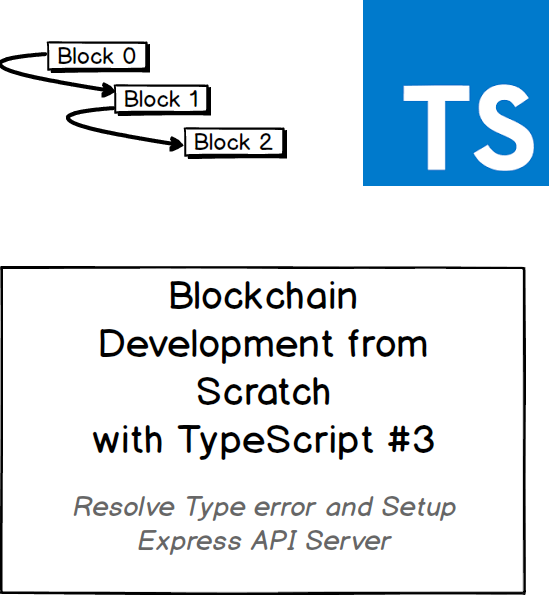
What Will I Learn?
- Resolve Type Error from the previous video
- Setup basic REST API with Express alongside with BlockChain classes
Requirements
- Basic understanding on how Express.js and REST API works
- Installed PostMan
- Basic understanding of BlockChain
- Understanding of Typescript
- Understanding basic of Object Oriented Programming and Data Structure
Difficulty
Advanced
Description
In this video, I will first resolve the type error from the previous video, and start to make a REST API with Express. I will be using PostMan to do HTTP GET and POST request.
Changed in code [Reference]
- Resolved Type Error 1 | 2
- Setup API Server
Install required dependencies
yarn add --dev @types/express @types/nodeyarn add express
Resolved Type Error
in src/types/class.ts, export out all the class interface
export interface TransactionData {
from: string;
to: string;
amount: number;
}
export interface BlockData {
index: number;
hash: string;
previousHash: string;
nonce: number;
transactions: TransactionData[];
key: string;
addTransaction(transaction: TransactionData): void;
}
export interface BlockChainData {
blocks: BlockData[];
difficulty: number;
addBlock(block: BlockData): void;
getNextBlock(transations: TransactionData[]): BlockData;
getPreviousBlock(): BlockData;
generateHash(block: BlockData): string;
}
in src/types/lib.ts, export out sha256 library. (Since there is no typings for js-sha256)
// js-sha256
declare module 'js-sha256' {
function sha256(data: string): string;
export = sha256;
}
Setup difficulty in BlockChain class
In the class constructor, setup the difficulty to be 1 for the ease of development.
In production, need to make sure that the difficulty is hard enough that you need a lot of computing power to hack it.
export default class Blockchain implements BlockChainData {
public blocks: BlockData[];
public difficulty: number;
constructor(genesisBlock: BlockData) {
this.blocks = [];
this.difficulty = 1;
In the mining part / generateHash
public generateHash(block: BlockData) {
let hash = sha256(block.key);
// mining
while(!hash.startsWith(Array(this.difficulty + 1).join('0'))) {
block.nonce += 1;
hash = sha256(block.key);
console.log(hash);
}
return hash;
}
Setup an API Server
Import necessary library, express for setting up Node.js REST API server, body-parser allow us to parse the incoming json file.
// external library
import * as express from 'express';
import * as bodyParser from 'body-parser';
Import all our classes (Blockchain, Block, Transaction)
// Our classes
import Blockchain from './blockchain';
import Block from './block';
import Transaction from './transaction';
import { TransactionData } from './types/class';
Initialize express server
// Setup express REST API
const app = express();
app.use(bodyParser.json());
Initialize Blockchain by passing in a genesis block. The transaction is set to be empty.
// Initialize Blockchain
// create a genesis block
let genesisBlock = new Block();
// initialize blockchain with genesis block
let bc = new Blockchain(genesisBlock);
// Transactions
let transactions: TransactionData[] = [];
Start a route with a GET request to 'localhost:3000/'
app.get('/', function(req, res){
res.json(bc.blocks);
})
Create a transaction with POST method
app.post('/transaction', function(req, res) {
let {from, to, amount} = req.body;
// create a transaction
let t = new Transaction(from, to, amount);
transactions = [...transactions, t];
res.json(t);
})
Mine the block
app.get('/mine', function(req, res) {
// mining part
let newB = bc.getNextBlock(transactions);
transactions = [];
bc.addBlock(newB);
res.json(bc);
})
Start the server on port 3000
// Start the server at port 3000
app.listen(3000, function() {
console.log('post started at 3000')
})
Next video
In the next video, I will make this server into decentralized database. Later on, I will build an UI front end with React.js.
Video Tutorial
Curriculum
Posted on Utopian.io - Rewarding Open Source Contributors
Thank you for sharing your posts with us. This post was curated by TeamMalaysia as part of our community support. Looking forward for more posts from you.
To support the growth of TeamMalaysia Follow our upvotes by using steemauto.com and follow trail of @myach
Vote TeamMalaysia witness bitrocker2020 using this link vote bitrocker2020 witness
Downvoting a post can decrease pending rewards and make it less visible. Common reasons:
Submit
Thank you for the contribution. It has been approved.
You can contact us on Discord.
[utopian-moderator]
Downvoting a post can decrease pending rewards and make it less visible. Common reasons:
Submit
Thank you moderator, really appreciate it 🙌
Downvoting a post can decrease pending rewards and make it less visible. Common reasons:
Submit
Hey @superoo7 I am @utopian-io. I have just upvoted you!
Achievements
Community-Driven Witness!
I am the first and only Steem Community-Driven Witness. Participate on Discord. Lets GROW TOGETHER!
Up-vote this comment to grow my power and help Open Source contributions like this one. Want to chat? Join me on Discord https://discord.gg/Pc8HG9x
Downvoting a post can decrease pending rewards and make it less visible. Common reasons:
Submit
Great tutorial, was easy to understand for a novice TypeScript coder.
You can use nodejs built in hashing library for making the sha256 hash so no need to import js-sha256 libraries ;)
here is my complete generateHash method:
Downvoting a post can decrease pending rewards and make it less visible. Common reasons:
Submit
I din know that, was finding a library which supporr types haha. Thanks for sharing about this.
Downvoting a post can decrease pending rewards and make it less visible. Common reasons:
Submit